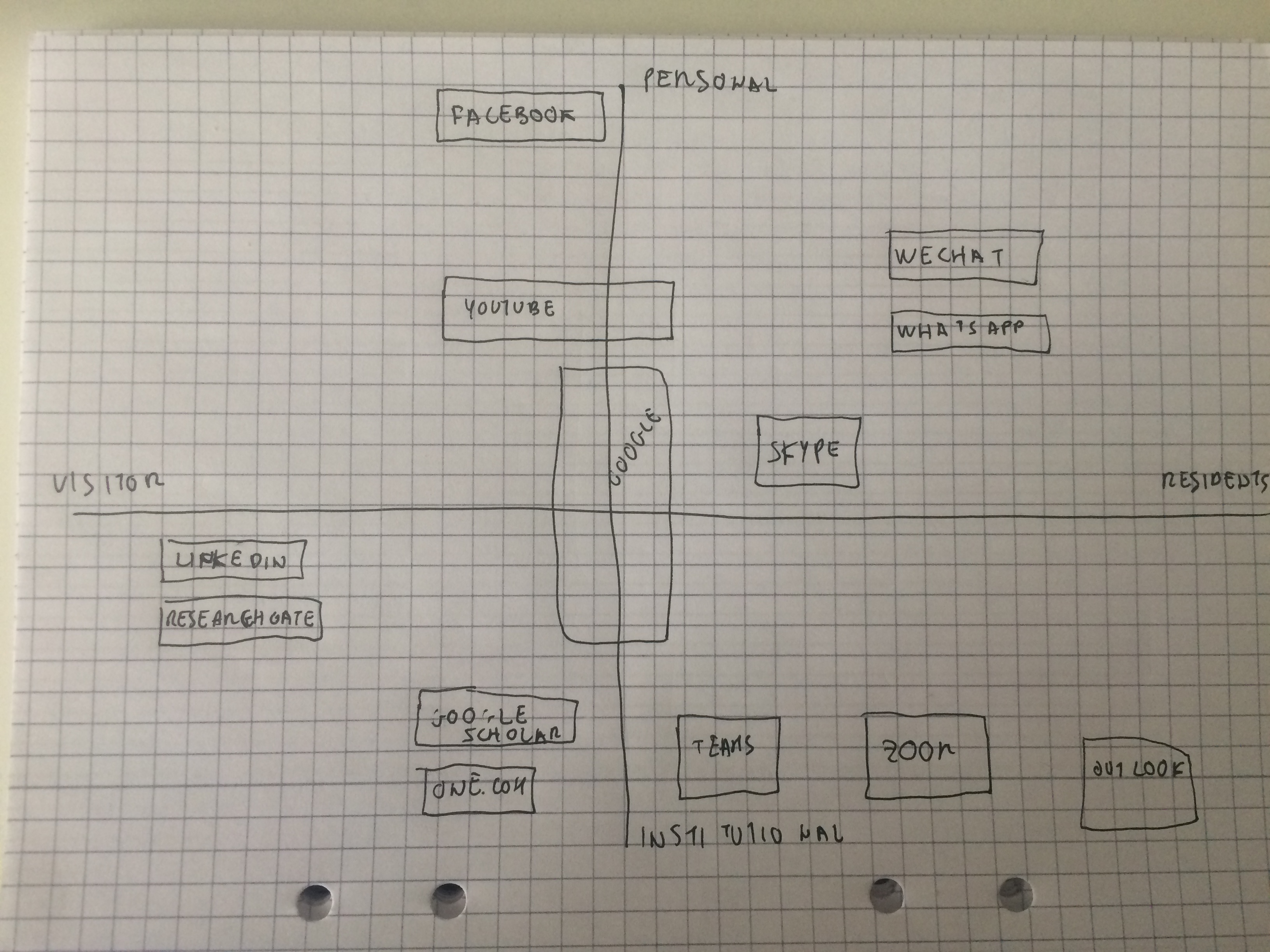During the first two weeks of the ONL course, we have been learning a lot about digital literacy through the enlightening lecture of Prof. David White. He introduced us the concept of “visitors” and “resident” in the context of engagement with the web. Visitors are those who use the web as a tool, instead, residents are those who interact and share with the web [1]. I have really appreciate the exercises done by Prof. David white to let us categorize our engagement to the web. Below is my updated resident and visitor map that help me a lot to make me more aware of my engagement with the web tools.

We have also discussed digital literacy, intended as pool of competences to be able to work in the digital world, mainly towards improving teaching and learning. The ONL course and more specifically our group´s facilitators, they have introduced us and support us in learning and using new digital tools (for instance, https://www.visme.co/, and https://coggle.it/).
In discussing the scenario for the topic 1, we have been focusing on how to create trust in online communities. Within this topic, I have mostly looking into socialization and how to promote socialization in online communities. Socialization is an important part for enhancing the learning activities within for instance an online course. By doing some literature review, I got interested in socializing activities to boost community development and learning [2]. I have discussed those activities with colleagues in the ONL group and at the university and I got a positive feedback on for instance let the students provide a more personal introduction of themselves at the beginning of each course. Another technique that I have learnt that is used to build trust and develop the on-line community of learners is the friendship-based feedback that means boosting the dialogue asking questions and providing nice comments to the received answer with the final goal of facilitating the conversation and discussion in the future [3].
I have really enjoyed work with the group, especially during the last meeting of this topic. We were creating the map of our scenario in coogle and it has been amazing to see how we were helping each other.
References
[1] White, D. S., & Le Cornu, A. (2011). Visitors and Residents: A new typology for online engagement. First monday, 16(9).
[2] Jiang, D., & Zhang, L. J. (2020). Collaborating with ‘familiar’strangers in mobile-assisted environments: The effect of socializing activities on learning EFL writing. Computers & Education, 150, 103841.
[3] Lee, S., Park, D. H., & Han, I. (2014). New members’ online socialization in online communities: The effects of content quality and feedback on new members’ content-sharing intentions. Computers in Human Behavior, 30, 344-354.

Hi Pietro! ONL also brought me a new perspective about the importance of socialization to improve learning. It´s great to know that the course is inspiring you. Thank you for sharing your thoughts and also for the references!
LikeLike
Thanks a lot Fernanda for the feedback!!
LikeLike
Hi,
Thanks for sharing your thoughts so openly. You are reflecting on the visitors and residence continuum and connecting this to your own practice. Does this reflection help you in any way? And if so, how?
Then you talk about trust and socialization in online learning. You also give examples on how to promote this as a teacher. You have also shared this and gotten great feedback! Soo lovely to hear! You are also lifting your groups collaboration and how you are helping eachother. So you are already toughing on topic 2 about openness and sharing. Looking forward to hear more about this!
LikeLike
Thanks a lot Lotta for the feedback!!
LikeLike
Concerning your question, I would say that the reflection helped me to categorize myself in terms of Prof. White schema. I have never thought about this before and personally speaking it has been extremely good to make me aware of my engagement with the web. I understood why my friends make fun of me that I´m like the FBI on Facebook, I can see everything of everyone but I rarely interact 🙂
LikeLike
Thanks for sharing your thoughts. Do you think you can easily apply the concept of ‘co-learning’ and co-creation of knowledge in your field of study and subject matter? I am curious if some subjects might have it harder to achieve this than others due to their nature when transitioning towards a digital form of education.
Cheers,
Mehrdad
LikeLike
Hi Pietro, very nice reflection. I enjoy your two tricks, installing an introduction session and triggering friendship-type feedback, very much for online learning
LikeLike
Thanks Junhe for the positive feedback!
LikeLike
Hi Mehrdad,
sorry for the late reply, after the course ended things got a little bit hectic with projects. I think co-learning and co-creation might vary a lot depending on the field, the heterogeneity of the group (national, international, from small villages, from cities, women and man, etc.), student attitudes (willing to learn, or simply want to pass the course), and also the length of course. Personally, I think it is difficult to apply in short-term courses (i.e., 2 months).
Cheers,
Pietro
LikeLike